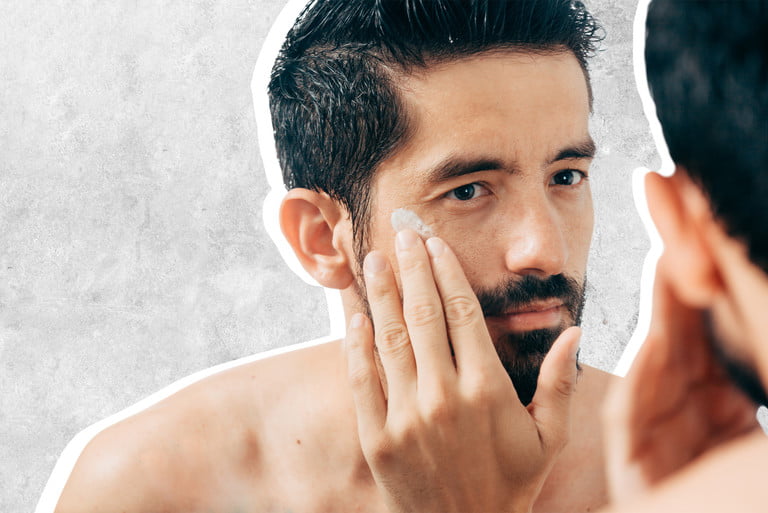For most people — myself included — vitamin C is a dietary concern, and like them, I make an effort to incorporate it in my daily meals and snacks. They know it’s common in citrus fruits and many other beneficial foods, but they have no idea that it can be a significant factor in enhancing skincare.
The men who do get it know they’re on to something. For men, vitamin C for skin is just as essential, and getting products that incorporate it is a key part of their daily skincare regimen. Like me, they know what those compounds and products are, and they understand what skincare with vitamin C provides and how it works. But it’s not hard to get those same results with a little research and some extra work, so I’m here to help you get those same advantages.
The basic benefits of vitamin C skincare for men

Let’s start with a simple statement: The benefits of vitamin C are both numerous and powerful when it comes to skincare. If you want proof, look to none other than Dr. Sheldon Pinnell, a leading researcher who established the baseline for vitamin C during his long, distinguished career. Pinnell passed in 2013, so he was well ahead of the curve with his research and conclusions.
“Vitamin C has been shown to be one of the most powerful antioxidants available for skin protection,” he explained. “It works by neutralizing free radicals that are caused by UV exposure and pollution.”
Those antioxidants can help you keep your skin tone even, and vitamin C can protect you from dark spots, redness, and pigmentation changes, especially as you grow older. Vitamin C also helps skin look brighter and feel fresher, in part because it enhances the natural elasticity of your skin.
But that’s just the beginning. Your body needs collagen to control the advance of wrinkles and fine lines as you age, and vitamin C can help boost your collagen production. You’ll get firmer, more youthful-looking skin when you commit to this combination, so it’s well worth looking into.
Don’t forget about protection from environmental damage, either. The effects of environmental stressors are steadily getting worse, but vitamin C gives you another tool to fight back in that area, too. And finally, think about hydration. Vitamin C enhances your skin’s ability to retain moisture, so that’s yet another reason to add it to your skincare regimen.
Include vitamin C in your shaving routine, too

Now that we know a little about the benefits, let’s get specific. You should use vitamin C twice a day — starting in the morning after cleansing, right before you moisturize. When you’re done shaving, you can pair vitamin C with sunscreen if you work outdoors or you’re going to spend a lot of time in the sun on a given day.
Doing this will help calm redness and irritation from shaving, and it gives you extra protection if your skin is sensitive. So what does vitamin C do for you as part of your shaving routine? It can also help repair razor burns and tiny nicks and cuts, and the ability of vitamin C to promote healing means it can help you deal with blemishes and acne scars.
The ABCs of vitamin C products

This is where science enters the picture. Once again, Pinnell provided a baseline standard for vitamin C products, based largely on the quality of the vitamin C.
“The key to effective vitamin C application is the right concentration and formulation,” Pinnell said. “Ascorbic acid can be unstable if not properly formulated.”
As a general rule, vitamin C products occur in three forms: L-ascorbic acid, magnesium ascorbic phosphate, and sodium ascorbyl phosphate. That’s a lot of science syllables, but it’s really not that hard to keep them straight if you stick to the basics. The first product, L-ascorbic acid, is the most effective, but it can also irritate sensitive skin.
Magnesium ascorbic phosphate is gentler, and it’s also water soluble, which makes it an excellent option for sensitive skin. The third product, sodium ascorbic phosphate, is more stable than the other two, and it’s considered an especially good choice if your skin is prone to acne.
Packaging is important when buying vitamin C products

Surprisingly, the way these products are packaged is important, too. You should always purchase products that come in dark containers, as this is one way to differentiate quality products from the lesser ones.
This kind of packaging keeps these products effective for longer, and quality vitamin C products are also airtight, which helps prevent oxidation. Observing these basic purchasing rules will help you get the most out of this vitamin C, but it comes in other forms as well.
There are two other options for vitamin C: serums and creams. Creams tend to work better on dry, while serums are lighter and ideal for fast applications if you’re on the go.
Combining vitamin C with other key skincare ingredients

While vitamin C can be very effective when used as an individual product, it also plays well with others. Pairing vitamin C with other key skincare ingredients opens up a world of other benefits, to let’s take a look at how those work.
Vitamin C pairs best with hyaluronic acid, which provides hydration. The key to getting the most from this pairing is to use vitamin C first, then add in whatever high-quality hyaluronic acid product you’ve chosen. Be sure to follow the instructions, too.
Vitamin C also works well with niacin amide, which can act as an effective layer to boost the strength of the skin barrier. This helps calm redness, and pairing these two powerhouse products can be used twice a day, or just for your morning or evening routine.
Regardless of which option you choose, always pair vitamin C with sunscreen, especially if you’re going to be spending a lot of time outdoors for your job or athletic activities. This is another additive choices, as vitamin C enhances the protection that sunscreen provides against UV damage.
Other product pairings that require caution

We’ll start our final look at vitamin C pairings with retinol, which can also be very powerful. The issue here is that it can cause problems with sensitive skin, so a light, split schedule should always be followed initially, e.g., use retinol at night followed by vitamin C when you wake up.
Finally, there’s glycolic salicylic acid. This compound can also provide skin benefits, but both products should have a low pH if you’re going to use it with vitamin C, as this will help prevent skin irritation.
Start slowly when you first use vitamin C for skincare

When you first start using vitamin C skincare for men as part of your routine, it’s important to protect yourself from potential skin problems. One way to do this is to patch test with different products, which can be a great way to find your baseline levels.
Once you do that, go with vitamin C two to three times a week for your first few weeks. Keep a careful record of the results, and remember that there are multiple apps available that can help you develop and add to your skincare routine.
After you work through this process, you can bump up the frequency of your routine accordingly. Always keep sunscreen as part of your regimen, though, as it helps prevent irritation in addition to giving you that extra protection.
Customizing your vitamin C usage in your skincare routine

One of the biggest side benefits of vitamin C is that there are many ways to customize your usage. This can be helpful for those on a budget, but try to use premium products whenever possible to maximize your benefits.
Here’s one sample routine to give you an idea how this might work. Start with a cleanser, then add a vitamin C serum with a low potency level. Add in a lightweight moisturizer, and finish your initial experiment with a sunscreen that has an SPF rating matches your skin sensitivity.
The nighttime version of this routine is even simpler. Start with a cleanser, then use a moisturizer. Doing this will help you establish a once-a-day level for vitamin C, and you can add it at night to see if that gives you even better results.
Specific fine-tuning is easy to do, too. Want brighter skin? Or maybe want to establish an anti-aging routine for the long haul? Both of these are possible once you see your skin improve over time, and you can make adjustments accordingly.
Power up your vitamin C skincare routine

One of the most powerful adjustments you can make is that hyaluronic acid/vitamin C combo, but with a different goal. Specifically, you want to get extra antioxidants to provide a higher level of hydration.
If you want to power up your nightly anti-aging routine even more, add a cleanser with exfoliating capability. Finish off your routine with a moisturizer designed to repair your skin power, and this will give your skin the ability to recover enough to handle external stressors.
Finally, if you’re one of those folks who faces tougher skincare issues like acne, scarring, or the effects of inflammation, know that vitamin C is a powerful way to fight back against these kinds of ongoing problems. Once you start to personalize your routine to tackle your individual issues, you’ll definitely be amazed at how effective using vitamin C for skincare is across the board.



